
Steve Jennings/Getty Images Entertainment
The tech bubble is back, or at least signs of a bubble are back. While Cloudflare (NYSE:NET) has given up some of its post-earnings gains, it remains over 50% higher than just several months ago and the valuation is hard to justify. The company continues to generate sector-leading top-line growth and there are signs that it is seeing momentum in uptake of its zero trust products. However, with the stock trading at 20x this year’s sales, I’d argue that the stock is not offering enough margin of safety given the aggressive consensus estimates and aggressive valuation against those estimates. NET remains one of the fastest growing names in tech, but valuation matters. Even in spite of the strong momentum, I recommend readers to avoid this stock.
NET Stock Price
NET has fully participated in the tech recovery – and more – and the recent surge has surprised even me given that the stock was not trading at cheap valuations even prior to the latest rally.
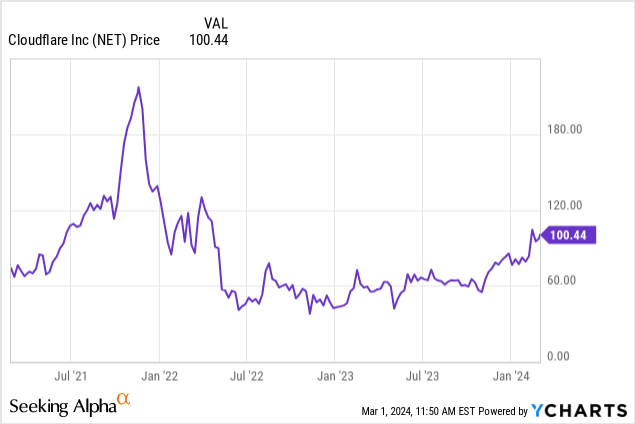
I last covered NET in December where I explained why I was downgrading the stock on valuation. The stock has surged another 25% since then, but I am not convinced that the latest earnings results warrant such a move.
NET Stock Key Metrics
In its most recent quarter, NET generated 32% YoY revenue growth to $362.5 million, comfortably surpassing guidance for $353 million. That was a strong close to a year in which revenues grew 33% YoY.
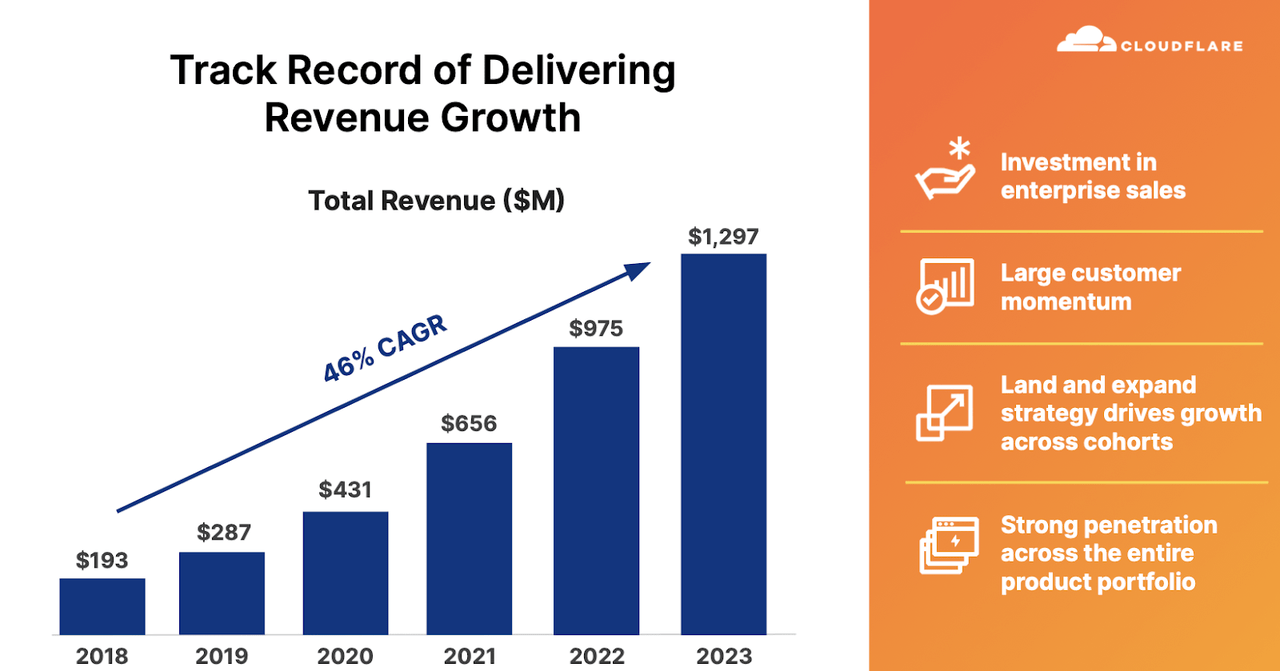
2023 Q4 Presentation
NET saw healthy sequential and YoY growth in customers but its dollar-based net retention rate continued to languish at 115%. While many companies would kill for such a DBNRR, NET’s stock arguably requires more aggressive growth rates.
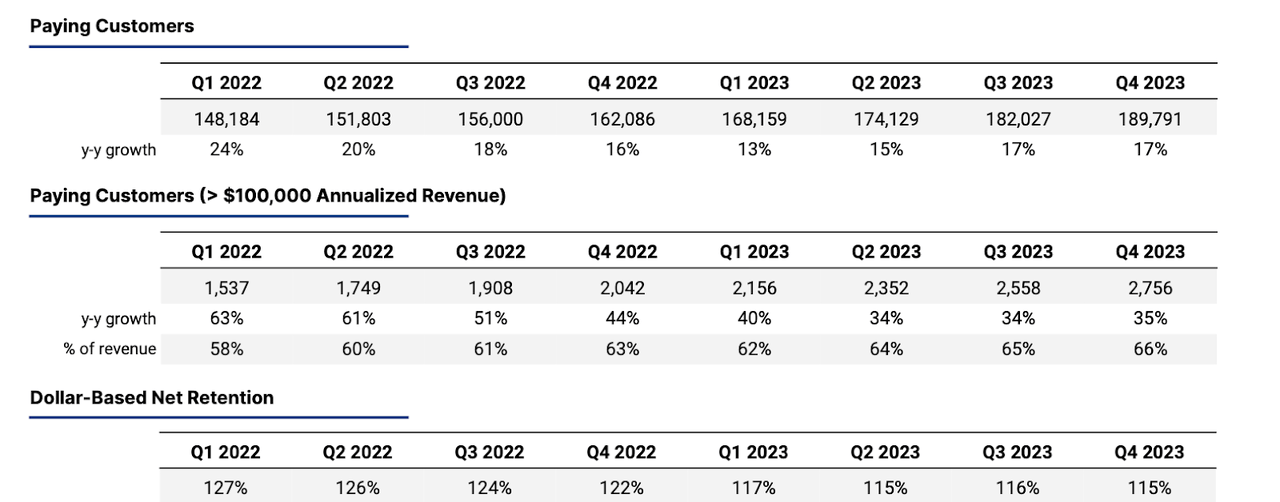
2023 Q4 Presentation
NET generated $39.8 million in non-GAAP operating income, surpassing guidance for $29 million. The company delivered solid profitability gains in 2023 but, unlike many peers, is not currently guiding for further margin expansion in 2024.
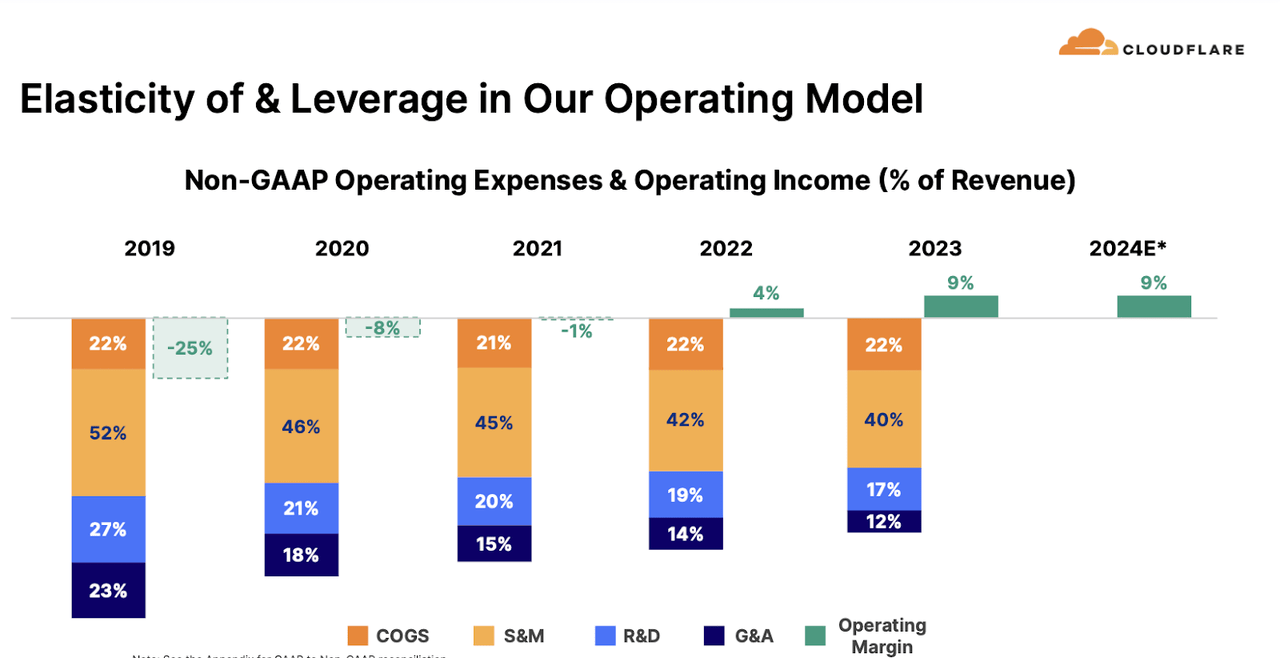
2023 Q4 Presentation
NET ended the quarter with $1.7 billion of cash versus $1.3 billion in convertible notes. These convertible notes mature in 2026 and carry an interest rate of 0%. This means that over the next couple of years NET may enjoy strong net interest income in spite of having a slim net cash balance.
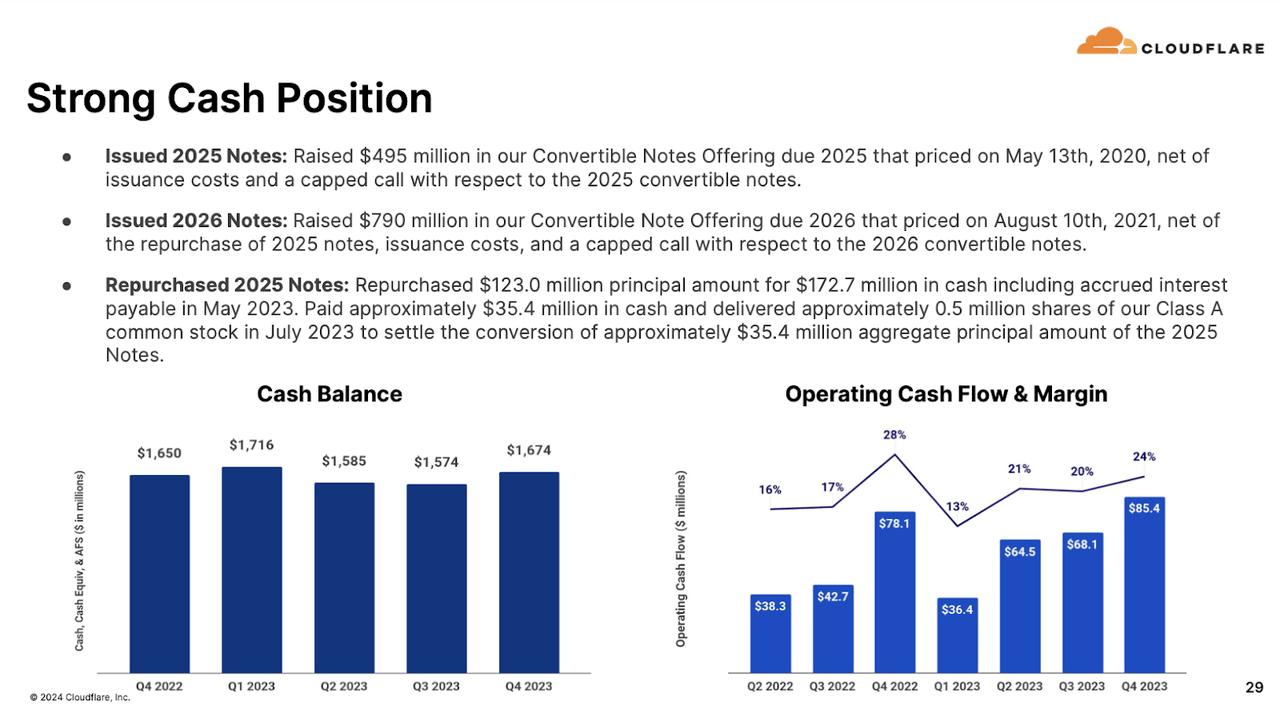
2023 Q4 Presentation
Looking ahead, management has guided for the first quarter to see revenue growth of up to 29% YoY to $373.5 million and operating margins of 9%. For the full-year, management has guided for 27% YoY revenue growth and up to 10% operating margins (non-GAAP). Consensus estimates call for NET to generate $373.25 million in revenue in the first quarter and $1.66 billion in revenue for the full-year.
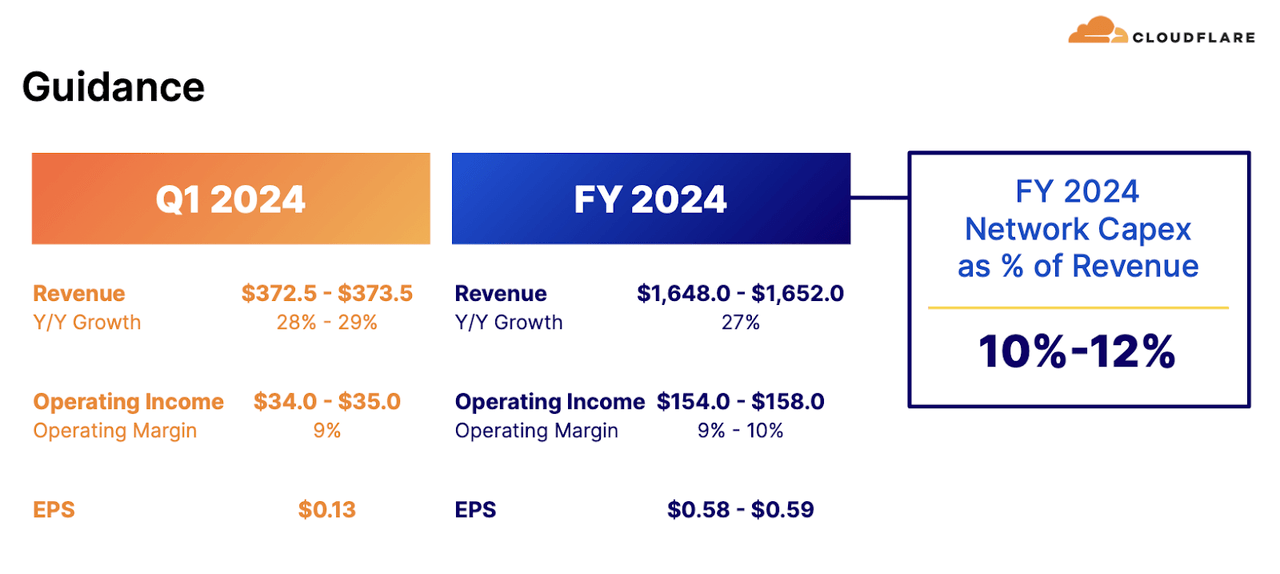
2023 Q4 Presentation
I expect NET to beat both guidance and consensus estimates given their history of having a “beat and raise” mentality.
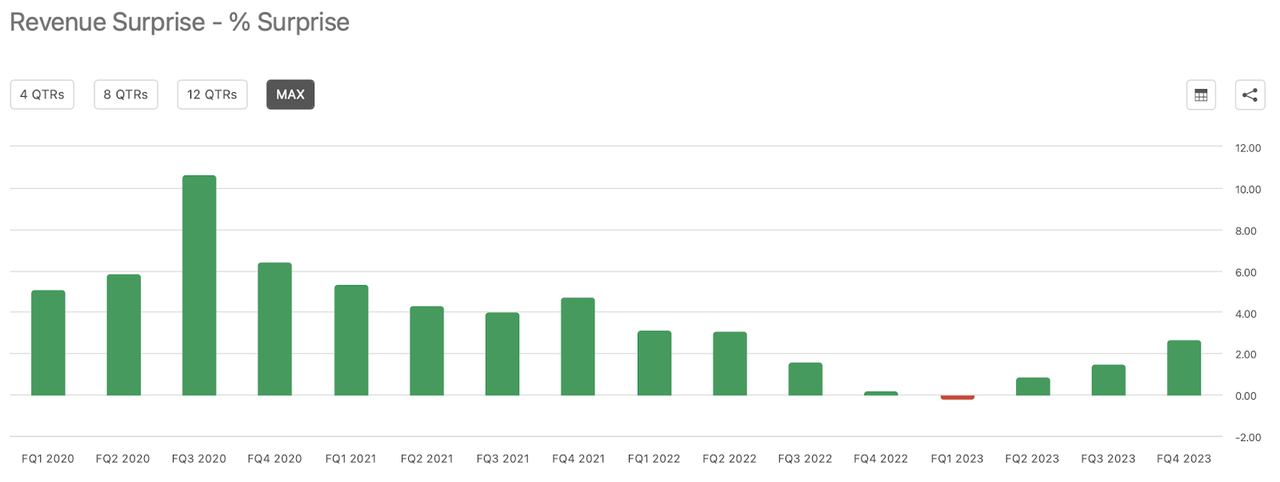
Seeking Alpha
On the conference call, management noted that they had signed their largest new customer in the US Department of Commerce for a $30 million total contract value. Perhaps it was this deal that drew the most enthusiasm from Wall Street, as management stated that they “believe deals like this validate the criticality of converging application performance, security, network and Zero Trust services on a unified platform.” Zero trust is one of the company’s newer products that management hopes will help continue the aggressive growth rates. The company also completed its largest customer renewal for a $60 million total contract value. Management noted that remaining performance obligations (‘RPOs’) were $1.245 billion, representing 15% QoQ and 37% YoY growth. Current RPOs came in at $908.85 billion, representing 10% QoQ and 35% YoY growth. These are very impressive numbers though they do not necessarily imply that the 27% full-year revenue growth guidance is conservative, given that the company exited 2022 with 45% YoY RPO growth and 40% RPO growth.
Is NET Stock A Buy, Sell, or Hold?
NET is a leading content delivery network which also provides adjacent cybersecurity services.
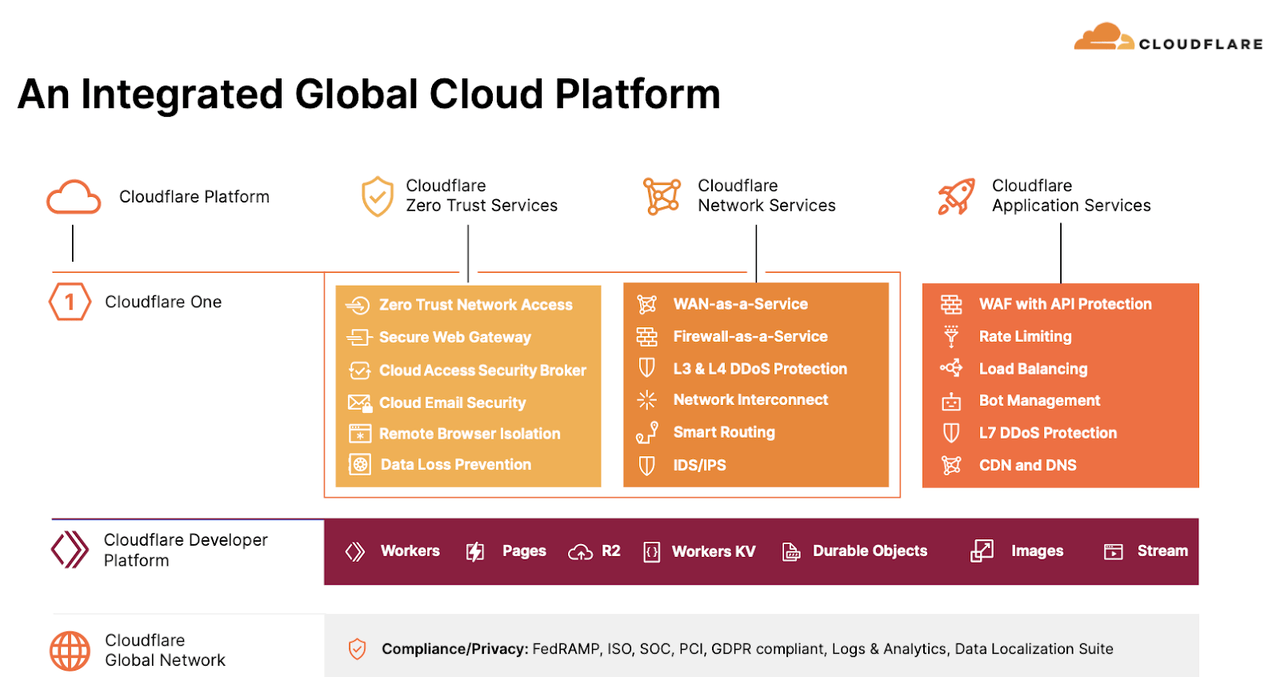
2023 Q4 Presentation
The stock has traded at premium valuations relative to peers for several years now and remains one of the priciest stocks at 20x sales.

Seeking Alpha
Consensus estimates call for the company to reach 34% net margins by 2032. I note that management’s latest guidance called for 20% operating margins over the long term. Consensus estimates look aggressive, there’s no other way to slice it.

Seeking Alpha
Wall Street appears optimistic that the company’s deal with the US Department of Commerce may validate the growth opportunity in zero trust. However, I’d argue that this optimism is fully reflected in the consensus estimates, which call for a very gradual pace of deceleration over the coming years. In particular, I am skeptical that the company will be able to sustain 25% to 27% top-line growth for as long as analysts expect and doubtful that the company can generate 18% annual revenue growth even as late as 2032. My only justification for that assertion is that the law of large numbers dictates that growth rates should decelerate as time goes on. Sure, the company might be able to create new products, but these new revenue-generation opportunities are reflected in consensus estimates. I see great reason to believe that NET may greatly underperform consensus estimates.
Yet let’s take consensus estimates at face value anyways. If we assume that NET trades at 30x earnings in 2032, representing a premium valuation that would place it with the likes of Microsoft (MSFT) and Adobe (ADBE), then NET might trade at around $248 per share by then. That implies around 11% annual return potential over the next 8.5 years. This would be enough to beat the market, but it is hard to get comfortable with both the consensus estimates and valuation assumptions. If we instead assume that NET trades at 25x earnings in 2032, still representing a premium valuation, then the annual return potential declines to 9%, which would be very much in-line with broader market historical returns. We saw this problem back during the 2021 tech bubble – tech stocks had overly optimistic estimates stretching out over many years and traded at aggressive valuations against those estimates. While NET is not trading as expensively as it did back then (at one point it was trading at over 100x sales), it is still trading at rich valuations which do not suggest a high likelihood of market-beating returns from here. I am increasingly seeing signs of a tech bubble in NET and other stocks and urge readers to avoid lowering return hurdles in an effort to join in with the hysteria. I reiterate my avoid rating on the stock as there has not been enough evidence to warrant the ever-expanding multiples in the stock.



